PIONEERRESPOND
Paul Albert Kurt HEINECKE 1876 - 1956
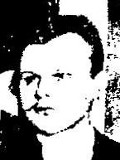 | |
| aka | K. Heinecke, Paul Albert K. Heinecke, Paul A. K. Heinecke, P. A. K. Heinecke |
| nationality | German; became a Swedish citizen on 21 Dec 1903 |
| occupation | Kontors-Chef; Director |
| birth | 28 Dec 1876, Hannover, GERMANY |
| baptism | 29 Apr 1877, Hannover, GERMANY |
| death | 27 Apr 1956, ............. |
| burial | |
| marriage | (1) married on 19 June 1900, Halland, SWEDEN (engaged on 5 Aug 1899)
 Anna Sophia LAMBERT B. Anna Sophia LAMBERT B. b. 2 Jan 1877, Trässlöv, SWEDEN |
| children | |
| marriage | (2) married on 3 Jan 1914, Stockholm, SWEDEN
  Anna Greta BERENDT Anna Greta BERENDT b. 11 Feb 1891, Stockholm, SWEDEN |
| children | {/c |
PARENTS
| father | Friedrich Wilhelm HEINECKE Eisenbahn-Büreau-Assistent / Railway Office assistant b. ............... |
| mother | Emma Ida Marie AEMILIUS b. ............... |
| children |
|
LIFE
Some passages from William Sinkler Darby's (unpublished) diaries in which the name of Kurt Heinecke occurs (with kind permission of Mrs. Maryanne Dassonville-Darby, Sinkler Darbys granddaughter):
- Tuesday March 21st, [1899, Bremen]:
We got to Bremer Haven, which is about 25 miles from Bremen, at 9 o'clock [pm] last night but we could not make a landing as the Custom House was closed and they told us that we would have to stay on board over night. The tender came out to us to get the mail and as I was in the sitting room talking to a young lady, much to my surprise someone [Kurt Heinecke] came up to me and wanted to know if I was Mr. Darby, that he had come from Hannover to meet me.
Well, I was very glad to see him and we got permission from the captain for us to land and we stayed at a hotel over night.
- Wednesday March 23rd [= 22nd], [1899, Bremen-Hannover]:
This morning we were up at 5 o'clock and drove down to the wharf to get my luggage and have it inspected by the Custom Office officials. The only thing that I had to pay duty on was the beeswax, which was 2 marks 10 P. or 50 ¢ in American money.
We left for Bremen at 9 o'clock and had to stay there about 2 hrs. for a train to Hannover.
It was nearly 5 P.M. when we arrived [in Hannover] and after going [replace "after going" by "afterwards we went"- HS] to a hotel called "Reichshof" where I will stay for a few days.
The young man who met me at the boat, Kurtz Hinaker [= Kurt Heinecke], is to be my assistant and will travel around with me wherever I go. He speaks 7 different languages and he will be a great help to me.
- Thursday March 23rd, [1899, Hannover]:
Kutz [= Kurt Heinecke], my assistant, came by the Hotel for me at 8.30 this morning and we went to the factory [at 18 Kniestrasse - HS] to get to work in making preparation[s] to go to St. Petersburg
- Friday March 24th, [1899, Hannover]:
Kurtz [= Kurt Heinecke] came by the Hotel for me again this morning and we took a car [= streetcar, tramcar - HS] for the factory [at 18 Kniestrasse].
- Sunday March 26th, [1899, Hannover]:
I got up this morning about 9.30 and dressed for breakfast and at 10.30 Kurtz [= Kurt Heinecke] came by for me and we went over to the laboratory...
- Monday March 27th, 1899 [Hannover-Berlin]:
I then commenced packing up the things that I wanted to take with me to Russia and at 1 o'clock Mr. Berliner telephoned to come down to his house to see him. Kutz [= Kurt Heinecke] and myself went down to his house and he spoke to us about the matter.
- Tuesday March 28th, [1899, Berlin]:
We went to the Hotel and had supper, after which Mr. Schwabe, Kurtz [= Kurt Heinecke] and myself went to one of the theatres where we stayed until 10 o'clock.
- Saturday April 1st, [1899, St Petersburg]:
Last night Kurtz [= Kurt Heinecke], Mr. Bourchard, Mr. Rappo [= Rapphoff], Mr. La Bell [= Lebel] and myself went to one of the largest Winter gardens where we spent a very enjoyable evening and had a very fine supper.
- Saturday April 8th, [1899, St Petersburg]:
Kurt [Heinecke] and I slept last night in our rooms and it was somewhat of a camping-out style. The rooms were cold and we had to hustle around and find some wood and make a fire.
- Sunday April 9th, [1899, St Petersburg]:
In the afternoon Kurt [Heinecke] and I went up to see Mr. La Bell [= Lebel], who has just returned from Hannover, and the three of us went out to dinner and talked over matters concerning the contract with Mr. [Joseph] Berliner and Mr. Bourchard, after which we took a carriage ride and then returned to our apartments.
- Sunday April 16th, [1899, St Petersburg]:
This morning my good looking soprano came in and made 7 records and I made a sample of a baritone, but I do not like his voice much.
After finishing up with the records, Kurt [Heinecke] and I went uptown and took dinner at the Hotel, after which we came back home and at 7 o'clock a photographer came and made 3 flash lights, one of Kurt and myself by the recording machine [the actual picture is in the WSD collection at EMI], one with Mr. Rappo [= Raphoff] [and one with] K. [Kurt Heinecke] and myself making a record.
- [Monday May 16th], 1899, [Flushing-Hannover]:
At Hannover we changed cars and I had 15 minutes in which to go to the hotel for my trunk and I just managed to get back to the station in time to catch the train but did not get my trunk on after all. Mr. Joseph Berliner, Jack Hawd and Kurt Heinecke were at the station to see me.
- Friday August 11th, '99, [Madrid]:
This morning before I was out of bed I heard somebody rapping on the door and calling "Sinkler, Sinkler!". I couldn't imagine who it was, so I went to the door hurriedly to see who it was and there I found Kurt Heinecke. He had just arrived in Madrid and about finishing a trip through Spain selling Gramophones.
= = = = = = = = = = = = = = = = = = = = = = = = = = = = = = = = = = = = = = = = = = = = = = =
In August 1899 Kurt Heinecke made a number of 7-inch zinc recordings in Berlin.
Hugo Graf: 42543-42548
He recorded two Italian male singers: Salvatore Starace (side number: 52619) and J. Artuso (side numbers: 52620-52626). These records have no matrix numbers.
Etched into the label area: E. Berliner's Grammophon - Patentiert in alle Ländern - Alle Rechte vorbehalten
(in: His Masters Voice/La Voce del Padrone, pp. 44 and 429)
On 9 August 1899 he also recorded a Swedish duo (Bergströms duo) and a Swedish trio (Bergströms trio) in Berlin: 84087-84091.
= = = = = = = = = = = = = = = = = = = = = = = = = = = = = = = = = = = = = = = = = = = = = = =
Here are a number of pages from an unpublished document written by Mr. Leonard Petts (in EMI Music Archive). They contain correspondence covering the period 19 September to 13 December of an unknown year (1902 or 1903?).
No doubt the relevant year was indicated somewhere in the original document, but not on the pages which I copied at the time. I reproduce the page markings exactly as in Mr. Petts' original document.
Pages GCE1-347 were not copied
GCE348
................. (beginning of this letter on previous page. Date unknown)
If you [Who? Theodore Bernard Birnbaum or William Barry Owen? - HS] and Mr. [Edmund Trevor Lloyd] Williams desire a General M.D. [Managing Director] to be named, neither my brother [Fred/Will Gaisberg?] nor I [Will/Fred Gaisberg?] have any objection to it, and we would, in this case respectfully propose your nomination (Birnbaum?) to this post, if you will kindly accept it."
In addition to France, Germany, Italy, Belgium and Holland, plans were being considered for the setting up of companies in Scandinavia.
A letter from London, to [Theodore Bernard] Birnbaum, now installed in the Hotel Bristol in Berlin, enclosed a copy of a letter from a Mr. [Kurt] Heinecke (letter not traced) respecting the Swedish Company:
"We have told Mr. Heinecke that in the first instance it will be better for him to see you on the matter, and we shall be glad if you will make an appointment with him, and after talking things over and getting all the information you can from him, communicate same to us with your views on the subject".
The same day, September 19th [1902? 1903? - HS], [William Barry] Owen sent [Theodore Bernard] Birnbaum a personal letter:
"I have been feeling first rate all this week, and am certain now to recover. I have been writing the Factory this morning, and have made the following estimate, which I fancy you like to know, viz;- That we shall require here for stock purposes between now and January 1st 50,000 Records; you, in Germany, 75,000; France, 50,000; Italy, 25,000 - in all 200,000 Records for stock, which undoubtedly we will have in the various countries on January 1st that we have not now.
Pages GCE349-362 were not copied.
GCE363
time.
Our business here remains about the same, September not being better than August; September is the worst month in England of any month in the year, but business has opened very good today- and I fancy that October will be a good month. We are getting settled in the new building and shall be prepared to do a very large business in the course of a week or two."
September 22nd Birnbaum wrote to [William Barry] Owen regarding Mr. [Kurt] Heinecke:
"I have your letter re Mr. Heinecke and am writing him to come over on Sunday. I saw him yesterday in Leipsic [Leipzig], but as your letter had not reached me in the morning before leaving for Leipsic [= Leipzig], I would not commit myself in any way. I have been carefully gathering information with reference to Mr. Heinecke, and I honestly say, that I am afraid to repose much confidence in him. He is too impulsive and too clever. I shall see him Sunday and shall not hesitate to bluntly give him my impressions. It is certain, that in the event of his being sent to Sweden, it will be necessary to hold him on a very tight rein. I suggest that any concession with regard to shares should be made conditional until he has prooved his capacity, thus, the interest on a certain number of shares might be paid to him in addition to a salary and the shares actually transferred after a given period. I will write you fully after my interview and shall probably send Hr. Heinecke to London in order to get an official statement of the details which he requires."
Heinecke, arrived in London on September 25th, where he saw [William Barry] Owen. Writing [Theodore Bernard] Birnbaum that evening, Owen informed him:
"... the first thing he (Heinecke) said was "Birnbaum has engaged me to go to Sweden and take charge of the Swedish Company and has informed me that all matters are arranged as to capital and that I am to spend
GCE364
two or three days here, go back to Germany, spend 8 days with Mr. Birnbaum there when Bendixon would come to Berlin and proceed with me (Heinecke) to Sweden and make the necessary arrangements". My remark in the matter was simply this "if this is all arranged what are you in London for?" and to this he could make no answer.
I received your telegram about the salary of Heinecke and also your letter in which you have investigated him and say that you cannot repose much confidence in him. Now at the present writing this is rather a mixed affair which I do not understand at all, but shall await your letter which will probably arrive tomorrow morning and then I will try and strain the matter out. My conference with Heinecke this morning inspires me with the idea that he is a "consummate ass" and that it is positively useless to expect that the man will conduct anything to a conclusion that would be at all satisfactory. I will await your letter however.
One remark of his which shows his utter lack of common sense and ability was "Mr. [Theodore Bernard] Birnbaum suggests that I be shown how you conduct your business here so that I may know how to conduct it in Sweden, and if you will spend half-an-hour in showing and telling me how to manage here it will be quite sufficient". I could do nothing but smile inwardly. Such a man ought to be able to run the affairs of all the nations on the Continent rather than devote himself to anything so small as the Gramophone Company, Sweden. His conceit surpasses anything and everything I have ever seen and I fancy that I shall give him a good, cold stiff throw-down unless there is something contained in your letter which leads me to think differently."
Writing to [Theodore Bernard] Birnbaum, on September 27th, [William Barry] Owen en referred to Hr. [Kurt] Heinecke:
"I am persuaded from the interview I have had with Heinecke yesterday and today that he is a consummate ass, nothing more nothing less and it
GCE365
is impossible to give this man charge of the business in anything like the capacity of a manager. He requires twenty five times as much managing as any man I have ever seen and I am uncertain what to do about him. I think I shall send him in the course of a couple of days, back to you, and let him help you out in the way of traveller, if you want to take the risk, I have even thought this questionable. I cannot ask Mr. Bendixson or any of the other friends in Stockholm to have such a man as Heinecke around them. It is impossible to bring him to any sense of realising what the work is he has to do, and out from under a strong hand, he would be doing something unusual and unexpected all the time. I am trying to think of some way of counteracting this and possibly within the course of the next twenty four hours I may involve some scheme, if so I will let you know."
Birnbaum replied to [William Barry] Owen's previous letter on [Kurt] Heinecke, on September 27th:
"The contents of your letters are surprising. I told Mr. Heinecke that I was very doubtful as to the propriety of sending him over to London at all, as in the event of his engagement I should consider myself in a large measure responsible. I practically told him politely that he was a conceited young ass, but that if he stuck to instructions rigidly, he might get on. He made the same stupid remark about learning how the London business was conducted, to which I replied that his inspection in London will probably show him nothing but a mere official routine. I gave him to understand that I would certainly act as his help and adviser in the event of his engagement. In the meantime I wrote [Joseph or Jacob - HS] Berliner for an official reference. He writes back to say that Heinecke is a clever and capable young man. While thoroughly recognizing the risk of his engagement I cannot help thinking that he might succeed."
GCE366
London wrote again on September 28th:
"We have given Mr. [Kurt] Heinecke a cheque for £15.0.0 to cover expenses of his trip to London, and this amount we have decided to charge back to the new German Company, as until it is definitely decided what shall be done with him we think it better that the expenses incurred by him should be paid by the new Company.
Of course, if anything comes of the negotiations re Sweden it is understood that we are to be debited back with the amount."
Although there have been passing references to the formation of a Swedish Gramophone Company, nothing, until this point, has been traced in the Hayes Archives to throw any light upon these plans.
Now, in a letter to Birnbaum, dated September 10th, [William Barry] Owen reveals:
"Now I want to write you about [Kurt] Heinecke. I have had him around for 3 days. At first I was not prepossessed with him but I will say that the fellow grew on me somewhat; he has some ability and I have made up my mind that it is possible to do something with him if he had some Directors who were present and would keep careful watch on him, and if his orders were very specifically given him. So I conferred with Bendixon and finally proposed the following:
That we would form a Company in London for £20,000 that we have 56% and the Swedish interest 44%, that the working capital be £2500 of which this Company would subscribe £500.0.0. and the individual members of it would subscribe £500 more in lots of £100 each, which Company could include you if you desire. Such subscription of the individual members to have its proportion of 44%, that there shall be two Directors resident in Sweden and 3 here, of which Bendixon would be one. We would look after all matters between this Company and the Swedish Company here, and the Swedish Directors should have a general control over the management here, and we would give them
GCE367
as much direction as necessary. The price to be charged to Sweden to be 35/- per machine and 10/- per dozen for Records. This is the matter complete; if [Kurt] Heinecke was to go he is to get £250.0.0. and £1000 from the English Company at the end of the first year's service in stock. I then called up Bendixon and explained the matter to him, but my impression is that it will not come to anything and that the whole thing will probably end in smoke, the possible reason for it being that he is not willing to take the responsibility of writing a letter right out and out and recommending the thing to his friends with that confidence which would ensure their taking it up.
At any rate I have arranged it so that he will send a letter to his friends today and we shall know without delay, and if anything comes of it before he visits Germany and sees you well and good. It strikes me as being a very fair and favourable proposition and if they do not take it up quickly, then they would be of no use to us or help either.
I think [Kurt] Heinecke would be of use to you in travelling in the meantime if you can give him strict orders; have them written down so that he can read them over and under no circumstances allow him to deviate from them.
He has dogged persistance which must win if well controlled. I also have demonstrated the fact that he understands our Machine, Sound Box and the general points of our business quite well enough. I must say that I could not see much use for his trip to London; he absolutely had nothing definite from Sweden to offer so that Bendixon was not in a position to say a word. I fancy that the proposition as I indicate above having been heard by Bendixon that it will be either
GCE368
"yes" or "no" within the next week."
Owen's plans to send Heinecke to Sweden seem to have taken a step backwards, for on October 12th, Birnbaum wrote to him:
"I wrote to ........[?] that Heinecke had been taken by the military authorities for one year's service; but as he [Kurt Heinecke] wrote me, he expected to get off. I refrain from confirming officially. I am afraid however they will keep him."
Writing to [William Barry] Owen, on October 26th, [Theodore Bernard] Birnbaum confirmed that there was now no question of Heinecke escaping military service, therefore, he had accordingly withdrawn him from the offered post in the new Swedish Company.
On September 30th, Owen wrote to [Eldridge Reeves] Johnson, reassuring him that the demand for gramophones and parts from Camden, would continue, and indeed, increase:
"I think by this time you will have received my letters in which I stated it is entirely our intention to rely upon you fully for the whole reproduction for the foreign market as well as for England. Mr. [Theodore Bernard] Birnbaum has just gone to take charge of the German Company and in a letter from him today he expresses it as his opinion that Germany will be a larger market for the Slot machine than this and we shall set to work to make large preparation for these machines. We will send you very soon a circular in which we are getting out all the different coins, practically for all the different countries, which will show the extent to which we are going to introduce it. [Belford Grant] Royal and [......] Turner are hard at work just now in getting a fine arrangement through for adapting these machines for practically every coin; samples of these will be sent you and it will involve only the carrying of a few extra points, viz, the Slot coin drop and the balance. All the other parts will remain the same. We have tested this Machine in Germany and it is a success. We are sending 24 Slots today.
Now, our greatest difficulty, and it is but a small one, has arisen...
Pages 369-549 were not copied.
GCE550
On December 12th, Birnbaum wired London:
"[Kurt] Heinecke free, have you made other arrangements, please write."
It will be recalled that Kurt Heinecke was the young man [William Barry] Owen and Birnbaum had considered for the proposed Scandinavian Company. In the middle of these deliberations Heinecke was called up for Military Service. During this service, according to Birnbaum, Heinecke had developed an attack of insanity, brought about, it was said, as a result of the railway accident he was involved in when in Spain, on gramophone business, in ........[?] This had apparently caused a shock to his nervous system. Birnbaum added:
"No doubt the disappointment and worry caused by his forced services contributed to his illness."
Miss [.....] Lewis replied on December 13th:
"As regards [Kurt] Heinecke there are no arrangements whatever made for Sweden, the last we heard about Heinecke was through Mr. Bendixsen in a letter from yourself, stating that he was in a mad-house. Mr. Bendixson, to whom I spoke yesterday on the telephone on the matter, was intensely amused and only said that he wanted to be quite sure that they were not dealing with a lunatic or a possible lunatic; otherwise if he is all right I believe Mr. Bendixson will be ready to take the matter up again."
On December 11th, Hr. Kaldor, of 'Yost' wrote to Birnbaum, from Budapest:
"I have today received news of a new Gramophone which is to be brought on the market on the 1st January and which will have a double membrane and thereby be as loud again and reproduce clearer than the previous instruments.
Another advantage of this apparatus is that records can also be made with same and that it can be wound up during the playing of same. It is similar to the one you saw at Dr. Sandor Nagy's offices. Further, records with red fibre and not black will be supplied with...
Next pages were not copied
[see also Theo HEINICKE/HEINECKE)
At the same time Nicole Frères, Limited, started another company in the name of The Symphonion Co., London, at 28 Ely Place, Holborn, to handle 'Symphonion' musical boxes, 'Edison' Phonographs and 'Zonophone' talking machines and 'indestructable' records.
The Manager of The Symphonion Co., London, was Theo Heinicke, who had been in the employ of Deutsche Grammophon, G.m.b.H., for a short time as a recording operator, but then moved on to the International Zonophone Company, Berlin, before being transferred to London.
recorder DEUTSCHE GRAMMOPHON GmbH (excerpt from The Zon-o-phone Record. A discography of recordings produced by the International Zonophone Company and associated companies in Europe and the Americas. 1901-1903 by Ernie Bayly and Michael Kinnear. Victoria, 2001. pp. 16-17)
I [HS] suspect the real name of Theo Heinicke, the manager SYMPHONION Co. London, was Kurt Heinecke (see: recording pioneer Kurt HEINECKE)
Heinecke hatte einen Direktorenposten in Stockholm bei AB Wahlén & Block, machte eine Blitzkarriere in der Stockholmer Finanzwelt. Er galt als steinreicher Exzentriker.
(German summary and translation by Eva Zöllner)
In a later article in Wikipedia he is listed as a "coal magnate" with an address on Strandvägen 7A, a top address in Stockholm. He is featured as a character in Sigrid Siwertz short story collection "En handful dun". Became a successful businessman, devoted himself to sailing, joined the Royal yachting club KSSS and owned several islands outside stockholm where he built a magnificent villa which still exists. No details of death found yet. See Swedish Wikipedia: https://sv.wikipedia.org/wiki/Kurt_Heinecke
(information from Pekka Gronow)
NOTES
- William Sinkler Darby's diaries (unpublished)
- His Master's Voice/Die Stimme seines Herrn: The German Catalogue : a complete numerical catalogue of German gramophone recordings made from 1898 to 1929 in Germany, Austria, and elsewhere by the Gramophone Company Ltd. compiled by Alan Kelly, Gramophone Company, & EMI Music Archive (Westport, Conn: Greenwood Press., 1994)
- His Masters Voice/La Voce del Padrone: The Italian Catalogue. A Complete Numerical Catalogue of Italian Gramophone Recordings made from 1898 to 1929 in Italy and elsewhere by The Gramophone Company Ltd. compiled by Alan Kelly with the cooperation of the EMI Music Archive, London (Discographies Number 30, Greenwood Press, New York etc., 1988)
- The Gramophone Co: Acoustic recordings in Scandinavia and for the Scandinavian market by Karleric Liliedahl (Suomen Suomen aanitearkisto, Finnish institute of recorded sound, Helsinki, 1977)
- Unpublished typescript document by Leonard Petts (in: EMI Music Archive)
- Sweden Household Examination Books, 1880-1930, page 169 (source: FAMILYSEARCH)
- Kurt Heinecke - gåtfull affärsman i kretsen kring Kreuger (in: Dagens Industri)
COMPANIES & LABELS
PHOTOS
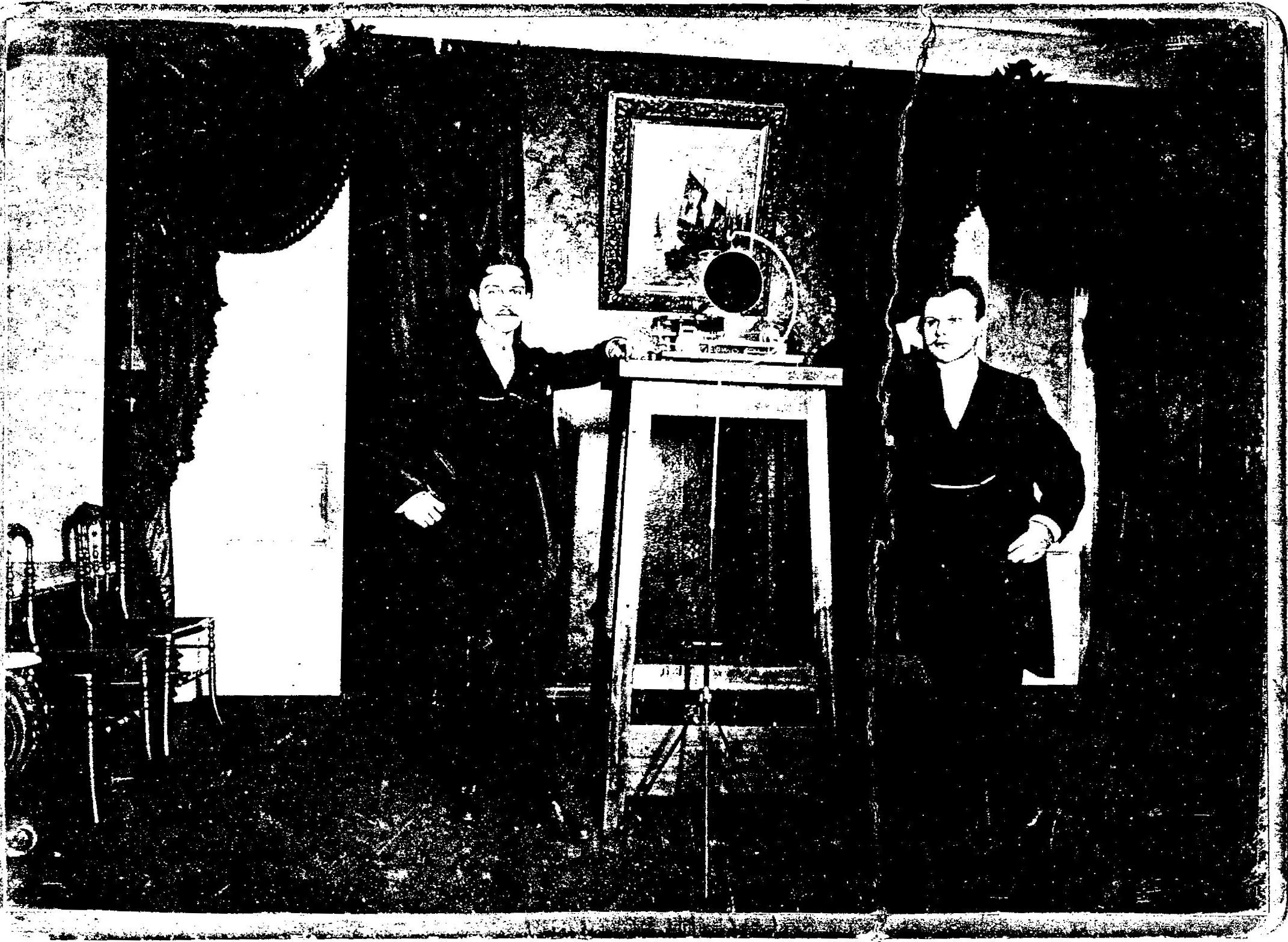 |
| William Sinkler Darby and Kurt Heinecke (16 April 1899, St. Petersburg, Russia) (Courtesy EMI Music Archive) |
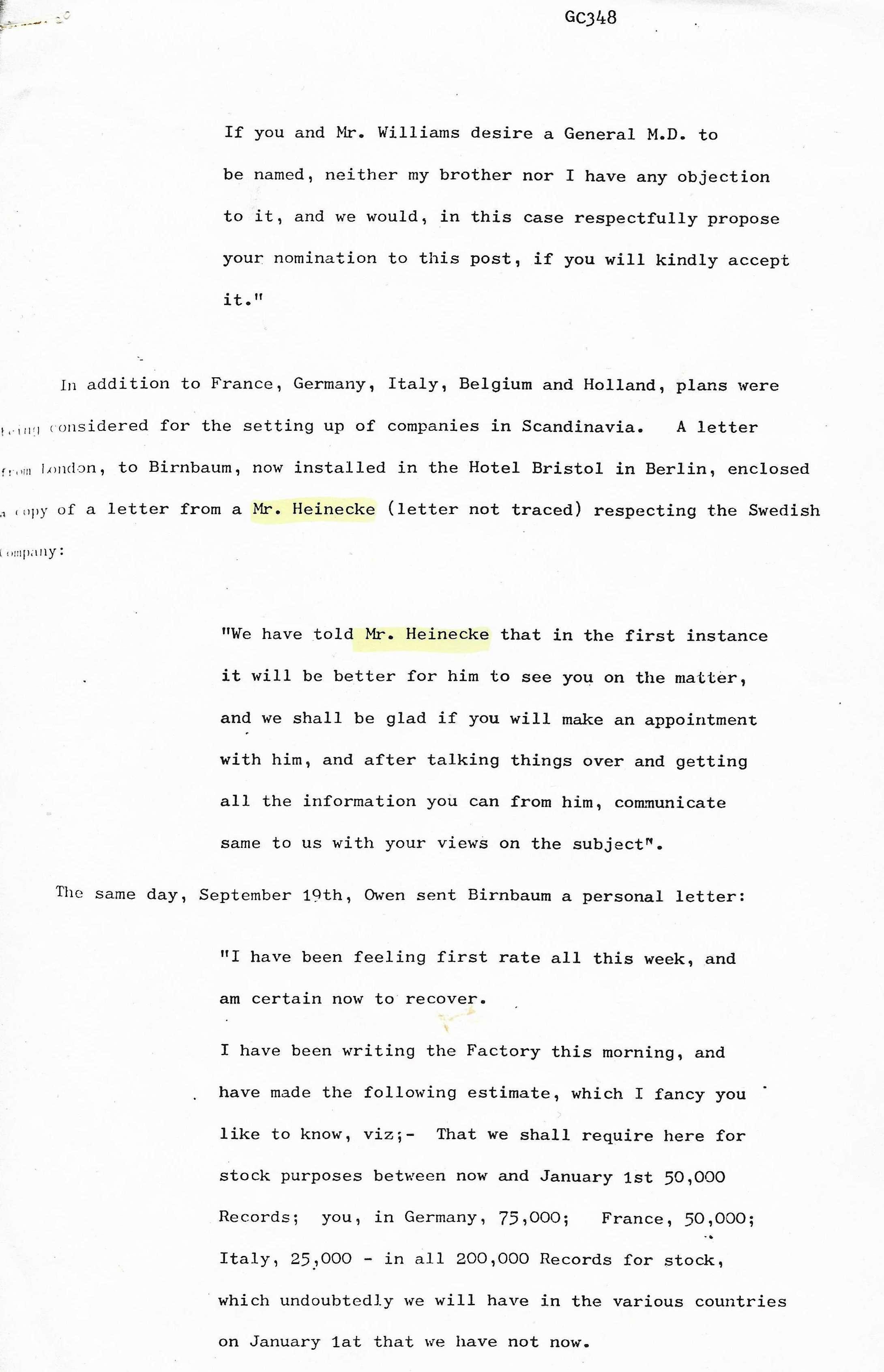 |
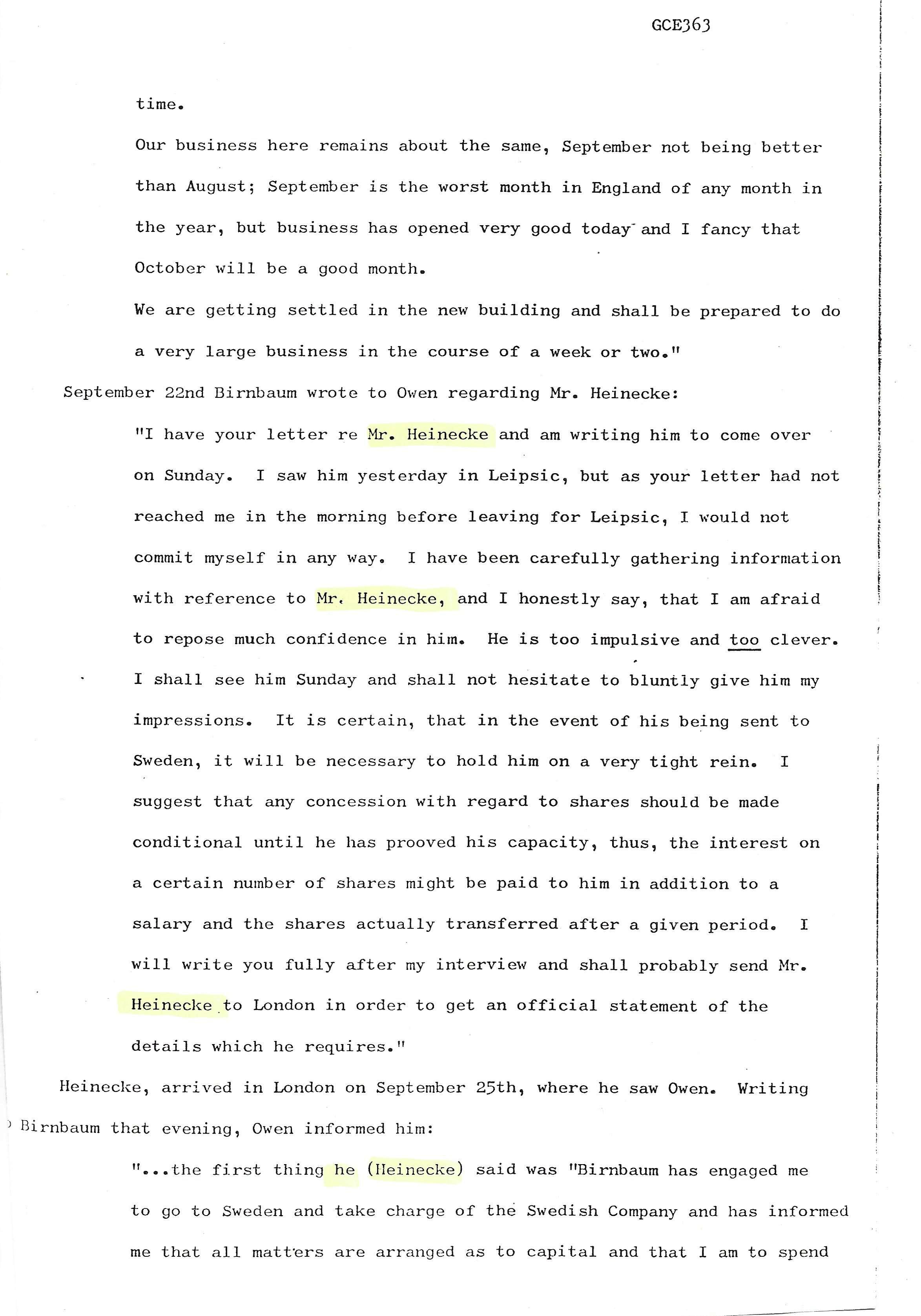 |
 |
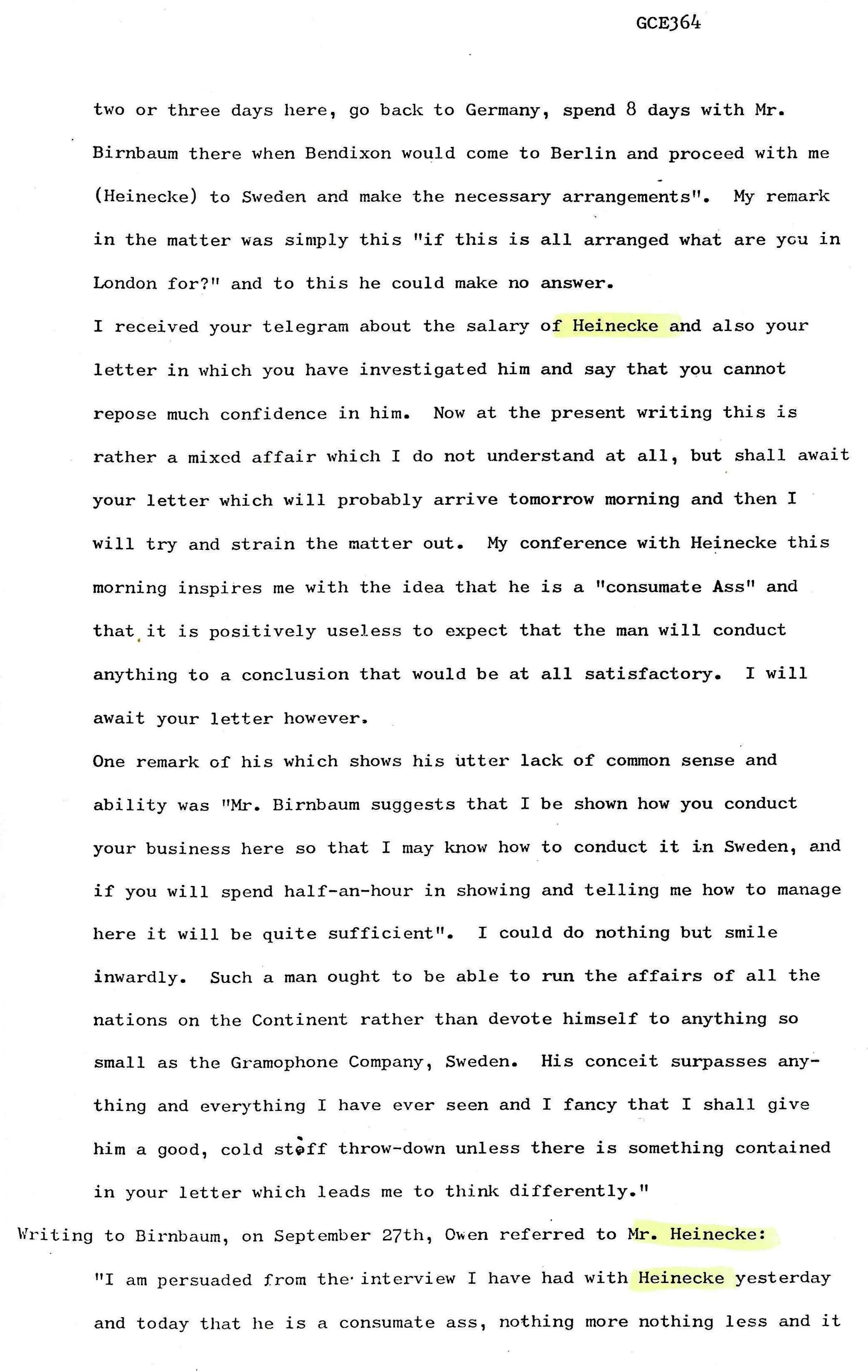 |
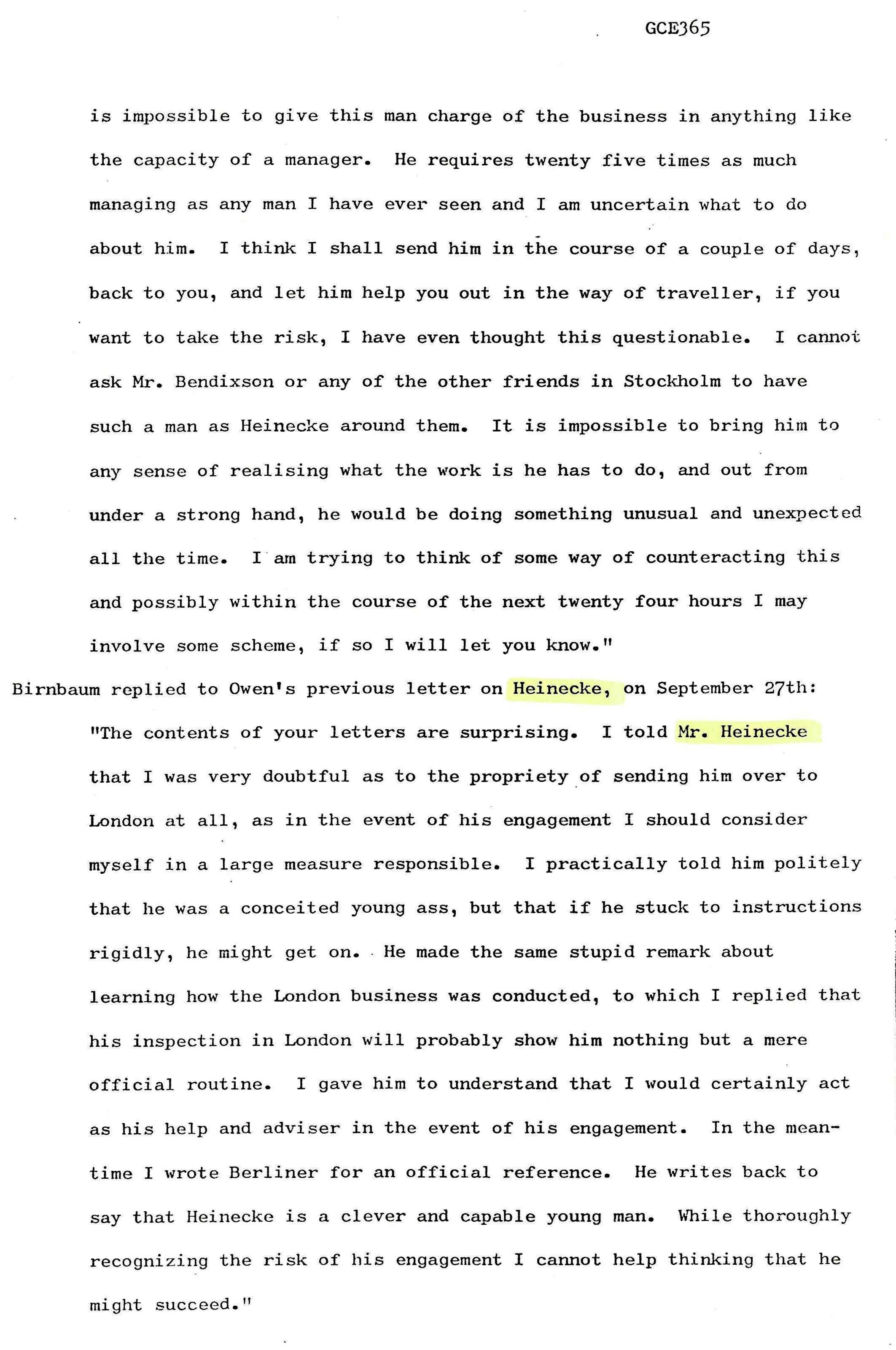 |
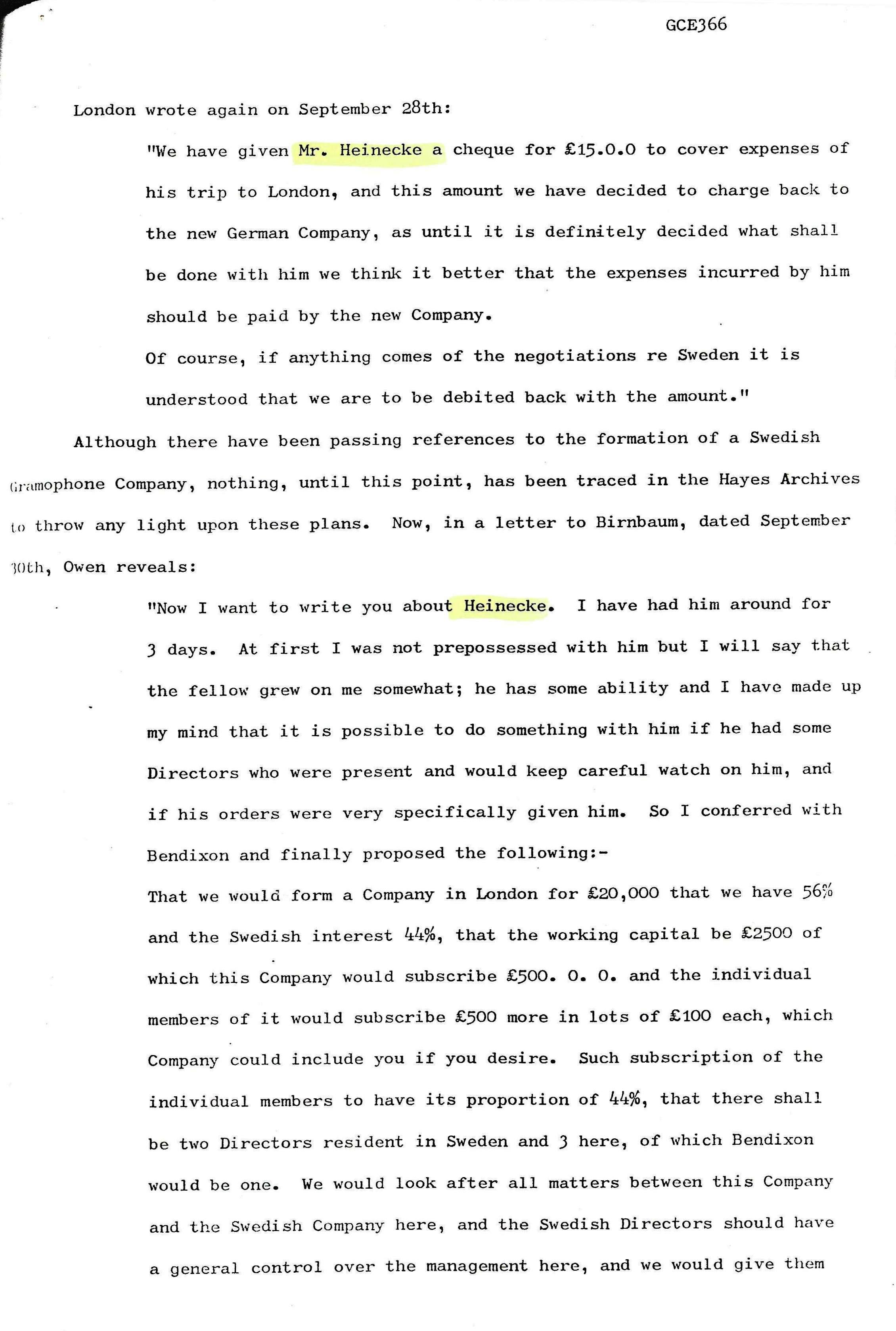 |
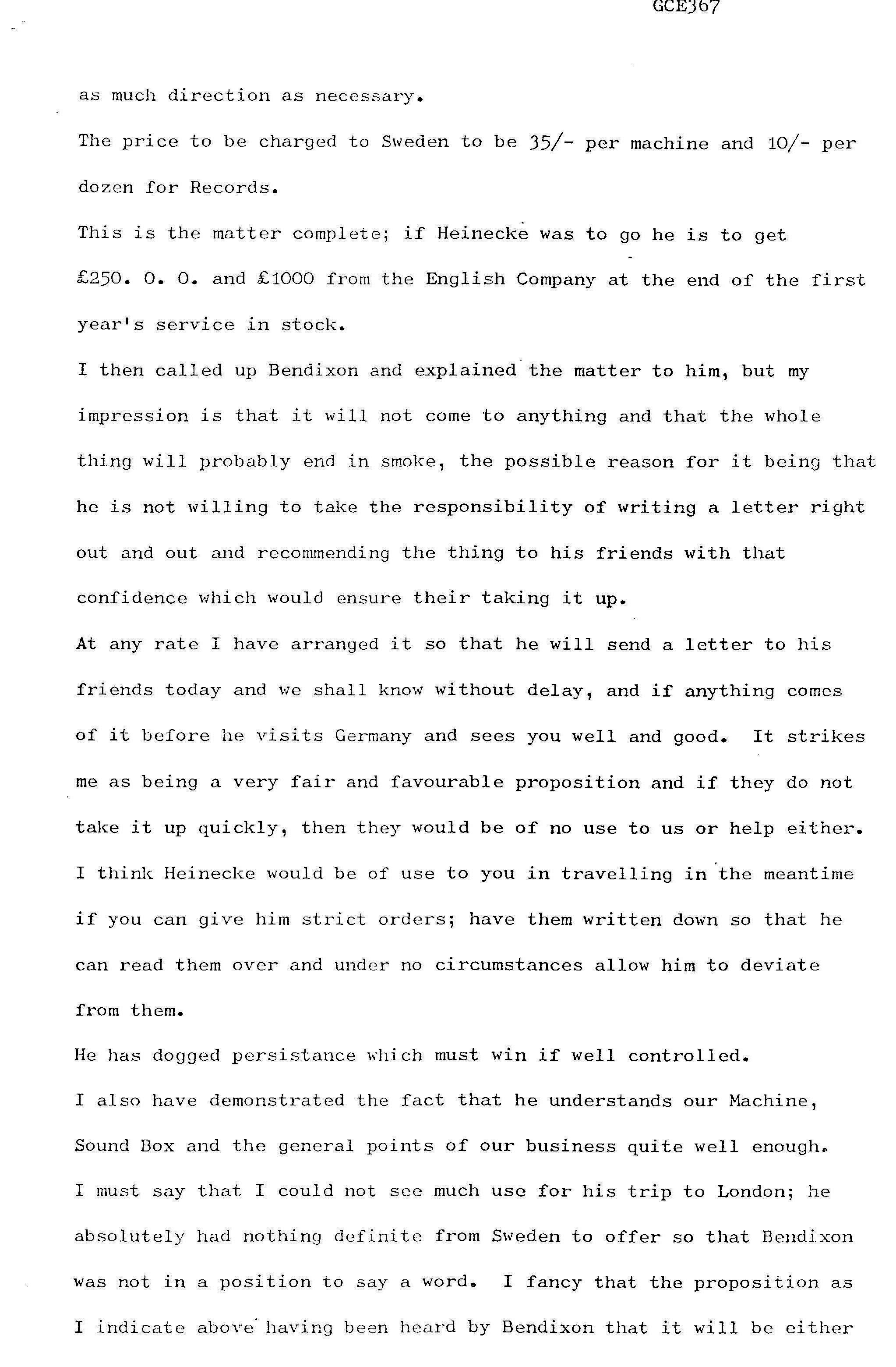 |
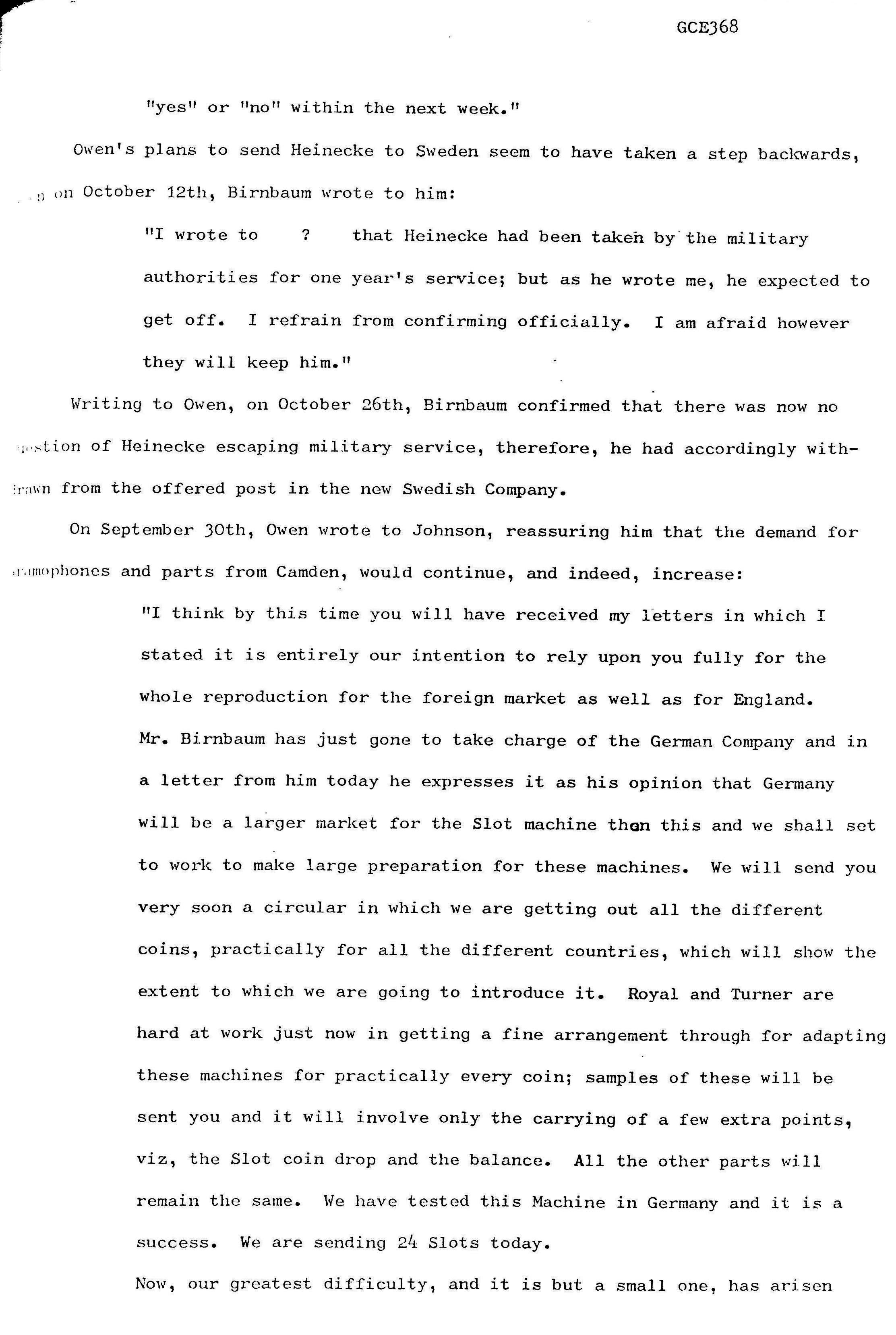 |
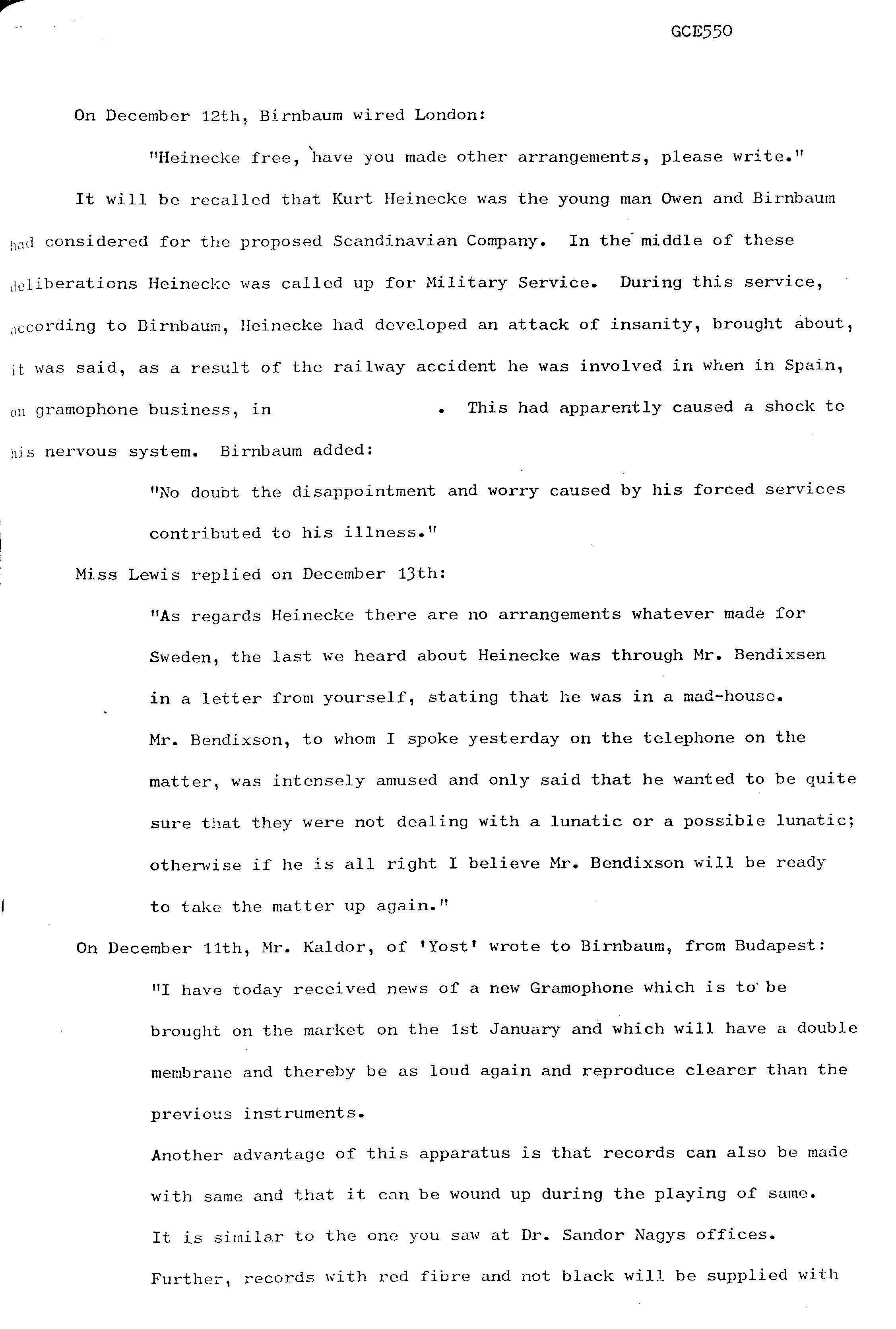 |
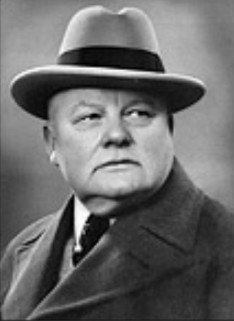 |
THANK YOU
Ruth Edge
Maryanne Dassonville-Darby
Björn Englund
John B. Milmo
Eva Zöllner
Pekka Gronow



